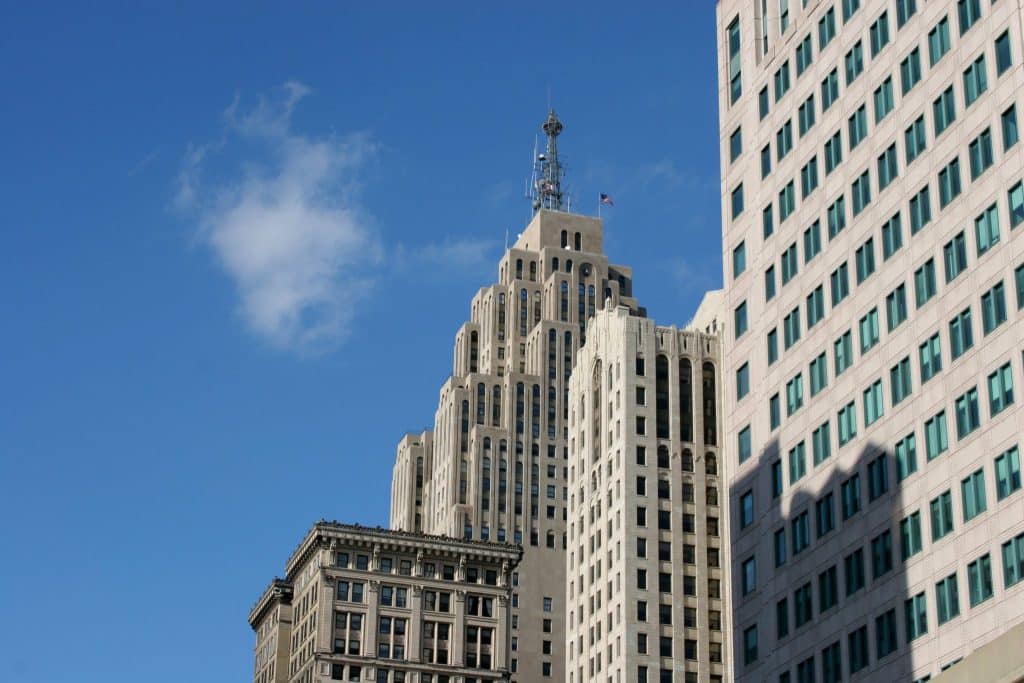
The Changing Nature of Detroit Office Real Estate
November 4, 2019
In downtown Detroit, its metropolitan area and beyond, the nature of office real estate—and work itself—is changing at a rapid pace. Aside from traditional factors like construction costs and occupancy and employment rates, Detroit businesses, real estate investors and professionals are now dealing with an onslaught of new elements that are greatly impacting the market for office space.
In order to navigate the complexities and changing nature of the market, companies and investors should consult with an experienced commercial real estate firm like Farbman Group to ensure their getting the best possible Detroit office space at the best possible price.
Here are just a few ways the office real estate market in the Detroit area is evolving.
Rise in Flexible Office and Coworking Space
What was once a novelty in Detroit has quickly become a growing trend as the city sees an increase in the number of freelancers and small businesses look for more minimalist accommodations. Flexible office and coworking space like WeWork, TechTown Detroit and Bamboo Detroit are offering modern amenities, opportunities for networking and a more communal setting that feels positively urban.
Even larger, multinational companies are renting space in these coworking areas for the simple fact that they can claim an address in the city. Flex and coworking office space is a component that real estate investors and landlords should consider when entering the Detroit office real estate market.
Downtown Environment Matters
Office buildings in Detroit suburbs like Southfield—while perhaps better in terms of amenities, space and rent prices—simply cannot provide a true downtown environment for their tenants’ employees to explore during their off-hours. And for many companies, this matters a great deal.
Today’s increasingly younger workforce is showing a sharp interest in walkable communities and urban environments. That’s why in downtown Detroit, you’re seeing a reactivation of alleys, streetscapes and all-around external space that provides professionals with cool lighting, engaging kiosks, outdoor games, live entertainment, modern seating and more—attracting companies looking to hire a younger crowd.
The Sprawl is Real
With the vacancy rate in Detroit proper the lowest it has ever been, investors and companies are beginning to sprawl out of downtown to areas like Midtown, New Center, Corktown and the surrounding suburbs. Downtown Detroit office tenants are dealing with fewer and more expensive parking options, higher rent and service costs and more—turning prospective organizations to alternative locations.
Taking the points above into consideration, suburban office buildings are investing millions of dollars into modern amenities, interior and exterior upgrades, greenery additions and engaging activities like food truck rallies, dessert stations and inter-office game competitions. These transformations, combined with lower taxes and overhead costs, are prompting more and more businesses to either choose the suburbs as their primary spot of expansion, or relocate from Detroit to save money.
Work with a real estate expert who can help you navigate the changing nature of Detroit office real estate. If you have questions about purchasing or selling office space in or around the city, contact Farbman Group and get in touch with a professional on our development team.
Related Posts

Crain's Notable Commercial Real Estate Leaders
Blog Post | July 17, 2024
Click Here for Full Article Scope of work: Andrew Gutman worked his way up at myriad commercial real estate firms to lead Farbman Group, Farbman companies, 30 million rentable square feet...
Read More
What’s a Broker to Do? Tight Vacancy and High Interest Rates Mean No More Slam-Dunk Deals
Blog Post | July 9, 2024
Brokers Have to Get Creative — as in Create Deals Brokers need to study their local markets like never before and know who the top buyers and sellers are, stressed...
Read More
Connect Midwest Multifamily Panelists on 2024 CRE Trends
Blog Post | June 26, 2024
CRE experts from the recent Connect Midwest Multifamily conference in Chicago reflected on their experience and the importance of meeting customer needs in business. As the age-old mantra says,...
Read More